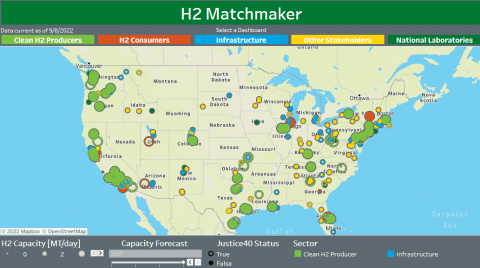The Regional Clean Hydrogen Hubs program–or H2Hubs–includes up to $7 billion to establish six to 10 regional clean hydrogen hubs across America. As part of a larger $8 billion hydrogen hub program funded through the Bipartisan Infrastructure Law, the H2Hubs will be a central driver in helping communities across the country benefit from clean energy investments, good-paying jobs and improved energy security.
Clean hydrogen hubs will create networks of hydrogen producers, consumers, and local connective infrastructure to accelerate the use of hydrogen as a clean energy carrier that can deliver or store tremendous amounts of energy.
The production, processing, delivery, storage, and end-use of clean hydrogen, including innovative uses in the industrial sector, are crucial to DOE’s strategy for achieving President Biden’s goal of a 100 percent clean electrical grid by 2035 and net-zero carbon emissions by 2050.
Hydrogen energy has the power to slash emissions from multiple carbon-intensive sectors and open a world of economic opportunity to clean energy businesses and workers across the country. Getting hydrogen right would mean unlocking a new source of clean, dispatchable power, and a new method of energy storage. It would mean another pathway for decarbonizing heavy industry and transportation.
The Bipartisan Infrastructure Law included several requirements for H2Hubs, including feedstock diversity and end use diversity.
This program will develop H2Hubs that demonstrate the production, processing, delivery, storage and end-use of clean hydrogen, in support of the Biden Administration’s climate goals.
The H2Hubs will form the foundation of a national clean hydrogen network that will contribute substantially to decarbonizing multiple sectors of the economy and creating good paying jobs.
Overview
Office:Office of Clean Energy Demonstrations |
New Program:Yes |
Funding amount:Up to $8,000,000,000 |
Funding Mechanism:Grant, Cooperative Agreement, or Other |
Recipients:Technology Developers, Industry, Utilities, Universities, National Laboratories, Engineering and Construction firms, State and Local Governments, Tribal, Environmental Groups, and Community Based Organizations. |
Period of Availability:Available until expended |
More Information
Projects that demonstrate the production, processing, delivery, storage, and end-use of, clean hydrogen through regional clean hydrogen hubs, which are networks of clean hydrogen producers, potential clean hydrogen consumers, and connective infrastructure located in close proximity.
Read the latest update on Regional Clean Hydrogen Hubs
Funding Opportunity Announcement ($7 Billion, issued in September 2022)
- Download the previously issued Funding Opportunity Announcement and read the Press Release
- Review the Community Benefits Plan Guidance (PDF)
- View the Funding Notice webpage
- Learn more about the H2Hubs encourage/discourage notifications
- Watch the H2Hubs applicant informational webinar
Demand-side Support Initiative for Regional Clean Hydrogen Hubs
- Read the Regional Clean Hydrogen Hubs Demand-side Support Request for Proposal (RFP) OCED News Alert
- Watch the Regional Clean Hydrogen Hubs Demand-side Support video recording and view the slides
- Read the previously issued Regional Clean Hydrogen Hubs Demand-side Support Notice of Intent Press Release
- View the Demand-side Support Notice of Intent to issue up to $1 billion to support the development of Regional Clean Hydrogen Hubs
- Read the issue brief from the White House on The Economics of Demand-Side Support for the Department of Energy’s Clean Hydrogen Hubs
- Regional Clean Hydrogen Hubs Demand-side Support Request for Proposal. Responses are due on October 26, 2023, 5:00 p.m.
- Regional Clean Hydrogen Hubs Demand-side Support Notice of Intent. Responses were due on July 24, 2023, 5:00 p.m.
- Regional Clean Hydrogen Hubs Funding Opportunity Announcement. Concept papers were due on November 7, 2022. Full applications were due on April 7, 2023.
View the OCED Regional Clean Hydrogen Hubs Factsheet.
H2 Matchmaker Tool
H2 Matchmaker is an online information resource to assist hydrogen suppliers and users with self-identifying collaborators and opportunities to expand development toward realizing regional hydrogen hubs.
Hydrogen and Fuel Cells Office
The Hydrogen and Fuel Cell Technologies Office (HFTO) focuses on research, development, and demonstration of hydrogen and fuel cell technologies across multiple sectors enabling innovation, a strong domestic economy, and a clean, equitable energy future.

